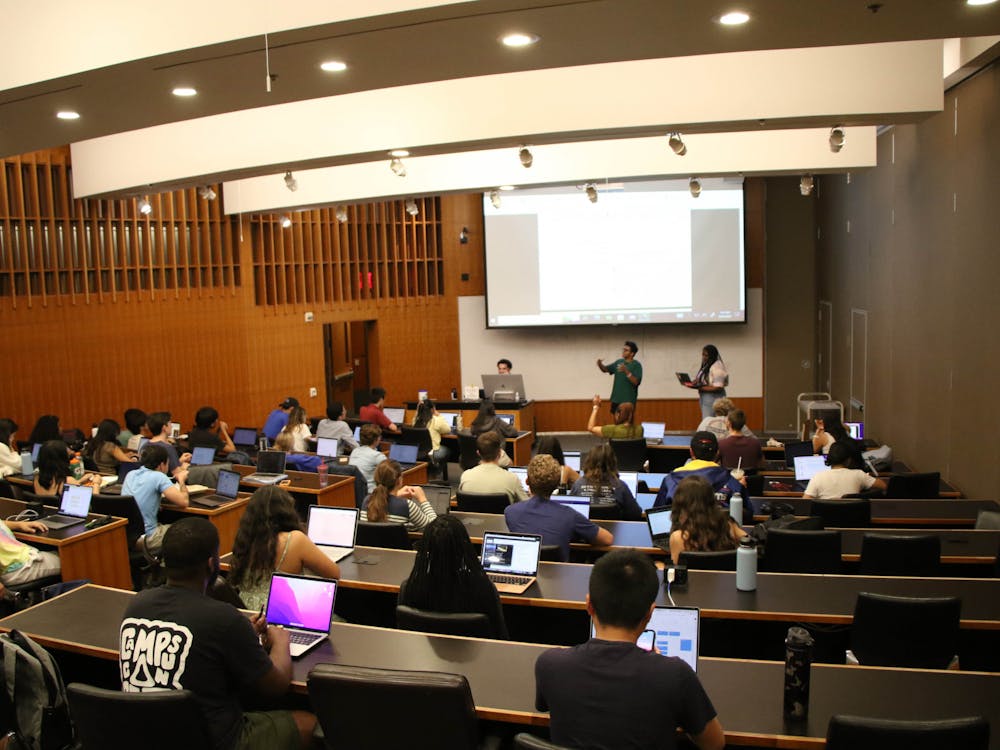Duke Student Government senators heard a presentation on proposed overhauls to the student group funding process and approved updated constitutional reforms at their Wednesday meeting.
Senior Hadrian Gonzalez Castellanos, chair of the Student Organization Finance Committee, presented proposed reforms to the funding process of SOFC. The two major changes proposed are expanding accessibility to funding and overhauling the annual budget process.
The proposed changes still have to go to a full vote after the introduction of legislation next week, according to Gonzalez Castellanos.
The reforms would end the practice of categorizing student groups as “chartered” or “recognized.” Chartered groups are able to access funding from the SOFC annual budget, while recognized groups cannot.
Under the proposed changes, the responsibility of recognizing new student groups would shift from SOFC to the Student Involvement and Leadership team in the Office of Student Affairs. This team would then categorize groups as “selective,” “non-selective,” and “competitive.”
The change would make group categories more intuitive, according to Gonzalez Castellanos. He explained that selective groups like Scale and Coin, Delta Sigma Pi and other pre-professional organizations have an application or recruitment process. Non-selective groups have no selection process and include multicultural groups like Mi Gente and Black Student Alliance. Competitive groups are “those who represent the undergraduate body at locally, nationally and internationally recognized competitions,” explained Gonzalez Castellanos. Examples include the University’s mock trial team and competitive acapella groups.
While all groups would have access to the programming fund, only non-selective and competitive groups would be eligible for SOFC funding for capital and operating expenses, which is reflective of current SOFC guidelines. Capital expenses include one-time purchases, like costumes or chairs. Operating expenses include travel costs and membership dues to national organizations.
The reclassification, if approved, would reduce competition among student organizations for funding by expanding access. The change would expand funding access to many “recognized” groups, increasing the number of student groups with access to funding from about 150 to 300, according to the SOFC presentation.
The reforms would also restructure the annual budget process. Student groups would no longer submit separate budgets. Instead, DSG would budget SOFC funding between programming, capital expenses, operating expenses and discretionary funds. Starting in the fall, student groups would request funding on a monthly basis directly from SOFC.
The need for changes comes from a rise in demand for funding. Over the past few years, SOFC has seen a “constant doubling” of student groups requesting funding, Gonzalez Castellanos said. The number of groups has made the current annual budget approach a long and inefficient process as groups incorrectly estimate their expenses for the upcoming academic year.
COVID-19 has also played a role, Gonzalez Castellanos continued. Many groups, including DSG, have accumulated funds over multiple years due to a lack of spending. The mix of prior and current allocations have made SOFC audits more confusing and difficult and the proposed system seeks to simplify the entire process and increase flexibility.
DSG’s proposed budget structure would contain five line items: a DSG general fund and SOFC programing, capital expense, operating expense and discretionary funds, instead of “over 500 line items” for individual clubs. During last year’s annual budget, DSG received 709 requests for funding.
None of these changes would be final, Gonzalez Castellanos emphasized in his presentation to the senators. SOFC would continue to tweak its rules in response to student group feedback throughout the coming year.
“Our hope is that once all the structural changes are approved by DSG, we will be able to then send a communication to all of the people who are in clubs, and also people who are not in clubs, for all undergraduates to comment on the policies as they exist ... and the policies as we hope to change them,” Gonzalez Castellanos later told The Chronicle.
He anticipates sending a survey and holding two information sessions.
When senator Brien Brennan, a sophomore, asked about SOFC’s predictions for the distribution of funds across the new breakdown in the coming year, Gonzalez Castellanos estimated that the money currently allocated for student groups in the annual budget would split 60% into operating expenses and 40% into capital expenses. Gonzalez Castellanos noted that travel, an operational cost, is the most common expense for student groups.
Senator Chase Barclay, a junior, asked about plans to ensure that SOFC would not run out of funds, especially since competitive groups often require more funding for national competition towards the end of the academic year. Gonzalez Castellanos explained that SOFC would like to increase transparency around remaining funds and encourage groups to make their own budgets. Gonzalez Castellanos described the uncertainty that clubs might face in creating their own budget estimates as a trade off between “foresight” and “flexibility.”
“We saw more issues with the lack of flexibility than with the foresight of knowing what two small amounts you are going to have, so by adding the flexibility, we hope that clubs will now be able to budget flexibly,” Gonzalez Castellanos said, referring to two part disbursements of funds to student groups at the start of the fall and spring semesters.
He added that DSG has about $267,000 remaining in its general fund that will carry over as surplus next year as a potential contingency fund.
Sophomore Jax Nalley, vice president of academic affairs, asked how SOFC would prevent groups from overestimating costs. Gonzalez Castellanos said that under the new system, “we will only pay for travel for competitions that people are currently enrolled in.”
Get The Chronicle straight to your inbox
Sign up for our weekly newsletter. Cancel at any time.
SOFC would also educate groups on fund collecting.
“There’s a bunch of ways that clubs can fundraise and receive money. Our hope is to decrease that barrier and increase the amount of education we have about how to develop,” he said.
Constitutional reforms withdrawn
Juniors Isaiah Hamilton, DSG president pro-tempore, and junior Ashley Bae, vice president for campus life, announced that, based on senator feedback, they have removed all proposed changes to the roles of cabinet chair, cabinet, directors, president pro-tempore and the proposed diversity, equity, and inclusion chair. These proposed changes were introduced at the last Senate meeting. Instead, the recently-approved constitutional reforms task force will consider these changes during the 2023-2024 academic year.
“We heard you,” Bae told the senators. “We should not be changing the constitution every year.”
The remaining changes include provisions to raise the minimum funding request requiring Senate approval from $1,500 to $4,000 and shift the responsibility of recognizing new student groups from SOFC to the Student Involvement and Leadership team in the Office of Student Affairs.
The senators approved the constitutional reforms unanimously. The amendment will appear on the ballot for referendum approval next Wednesday. According to the DSG Constitution, a majority of students voting must ratify the changes for them to take effect and at least 15% of the undergraduate student body must vote.
In other business
Barclay reported that the Academic Affairs Committee is collecting student feedback on the recent change in class times for the fall 2023 semester.
Following up on Duke Sport Clubs’ presentation during last week’s meeting, the senators approved a budgetary statute to fund $50,000 for Duke Sport Clubs in the 2023-24 academic year. The funding is a temporary solution as stakeholders work to create an “operational framework” for a separate funding source for Duke Sport Clubs, the statute explains.
During the debate on the budgetary statute, Hamilton called an executive session to discuss particular financial numbers with Duke Sport Clubs, in which The Chronicle was asked to leave. According to the DSG constitution, the Senate is closed “to the Duke Community” during such sessions.
The senators allocated $1,604.25 for Speak of the Devil’s 30th Anniversary Concert on April 15, $2,310.00 for Catalyst’s Duke IGNITE Hackathon March 31 to April 2, $1,950.00 for Duke Africa’s Ramadan Iftar on April 2, $3,320.05 for Duke Chinese Dance’s Spring Showcase on April 8 and $3,324.65 for Pureun’s showcase on April 21.

Senou Kounouho is a Pratt sophomore and a university news editor of The Chronicle's 119th volume.

